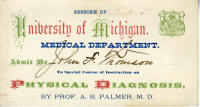Alonzo B. Palmer, M.D.
Click on image to enlarge
Death date: Dec 23, 1887
Place of death: Ann Arbor, MI
Type of practice: Allopath
Journal of the American Medical Association Citation: 9:835, 10:764
Professor Alonzo B. Palmer, M. D., LL. D., Professor of Pathology and the Theory and Practice of Medicine in the Department of Medicine and Surgery of the University of Michigan, died at his residence in this city on Friday, the 23d of December, 1887, in the seventy-third year of his age.
Dr. Palmer was associated with the University of Michigan for more than thirty-five years. In 1852 he was appointed Professor of Anatomy ; in 1854 he was transferred to the mixed chair of Materia Medica and Therapeutics and the Diseases of Women and Children. And again, in 1860, he was assigned to the Professorship of Pathology and the Theory and Practice of Medicine, which position he held up to the time of his death.
During this long service, which almost covers the life history of the Department of Medicine and Surgery, and engaged as he was in teaching therein several branches of medicine, he had a large influence in shaping the general policy of the Medical Department, and contributed very materially to its unbroken success ; and it was his rare good fortune to see the college which had started as a feeble organization, limited in patronage and weak in influence and power, steadily develop into one of the largest and most prominent of the medical colleges of the country, and to realize that he could with strict justice assume to himself no little credit for his efforts in contributing to this end.
His success and his reputation as a teacher were not limited to the bounds of our own University, and he was tendered appointments in other institutions. The arrangement of the annual term of lectures in the Medical Department was then such that a portion of each year was unoccupied in his professional work here, and he therefore, in 1863, accepted an appointment to the same chair which he filled here, in the flourishing Berkshire Medical College, at Pittsfield, Mass., and in 1869 a similar position in the Medical Department of Bowdoin College, at Brunswick, Maine.
These engagements were terminated, at Pittsfield, by the gradual decline and ultimate dissolution of the Berkshire school, and at Bowdoin College by the adoption in our own University, in 1877, of the graded system of medical education, and the extension of the lecture term to the full collegiate year of nine months, which neccessitated his continued residence here.
In the different colleges in which he was engaged, it is probable that from eight thousand to ten thousand students have sat under his teachings. The large majority of them entered into practice, and it is simply impossible to estimate the influence which our late colleague must have exercised upon the working members of the medical profession in this country ; and it is simply appalling to think of the limitless disaster that must come from one not governed by high and manly motives, and pure and elevating principles, in association with such a large number of young men.
Outside of his chief work as a teacher, his fixed principles led him to other efforts at doing good. He was a stern and uncompromising opponent of the use of alcoholic or other stimulating or narcotic agents. His devotion to fixed convictions of duty in these matters was firm and constant, and so he was always found in the front ranks of the workers for reform, urging with all his strength others to join in the work, and encouraging by his advice, his personal example, and his aid, the support of organizations formed for such purposes.
In the literature of medicine, Dr. Palmer contributed many fugitive essays of interest and value. Besides these, he published " Lectures on Homoeopathy," in permanent book form, and a text-book for schools entitled " Temperance Teachings of Science," which has had a wide circulation. As the crowning work of his life he published, in two large octavo volumes, a complete treatise on " The Theory and Practice of Medicine." In preparation for this work, he was many years collecting materials, and just previous to the immediate work of composition he spent over a year in Europe, in the colleges and hospitals, to avail himself of the most recent advances in medical science and art. It will remain a monument to his industry, his ability, and his devotion to duty, and his intense desire to aid in the advance of the study and work of his life, practical medicine.
The esteem in which his ability and attainments were held by his brethren in the profession is indicated by the fact that in the International Medical Congress, which recently met at Washington, he occupied the important position of chairman of the Section of Pathology, and in that capacity gave an address in the general session of the Congress ; and in the American Medical Association he held at the time of his death the office of chairman of the Section on the Practice of Medicine.From the Bowdoin Alumni: Lectr. Theory and Practice of Med. 1869-70; Prof. Pathology, Therapeutics 1870-73; Pathology, Practice Med. 1873-79; M. D. at College of Physicians and Surgeons, Western Dist. N. Y. 1839; A. M. Univ. of Nashville 1855; LL.D Univ. Mich. 1881. Born Richfield, N. Y. 1915. Physician in Chicago, Ill. Prof. Material Medica, Diseases of Women and children, Univ. Mich. 1854-60
Surgeon 2nd Michigan Volunteers 1861. Professor of Medicine Univ. of Michigan 1860-80. Died 1887, Ann Arbor, Mich.
